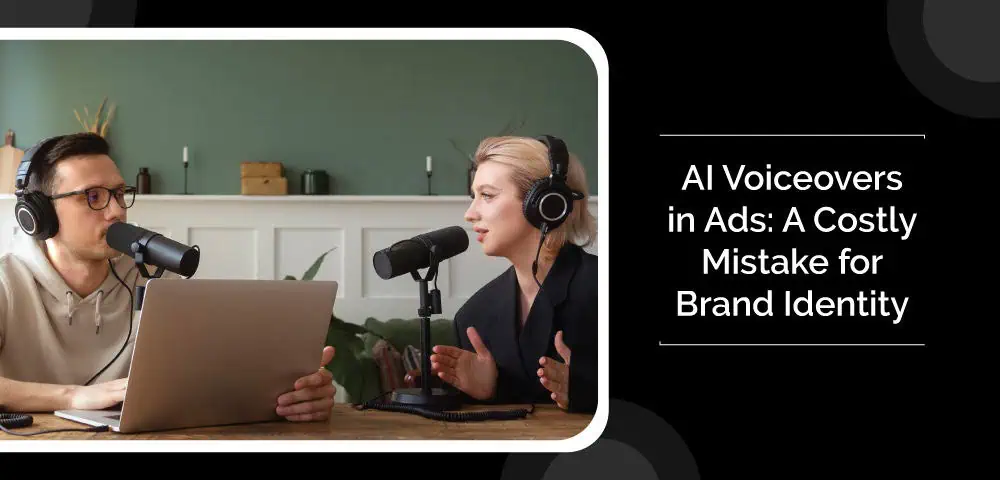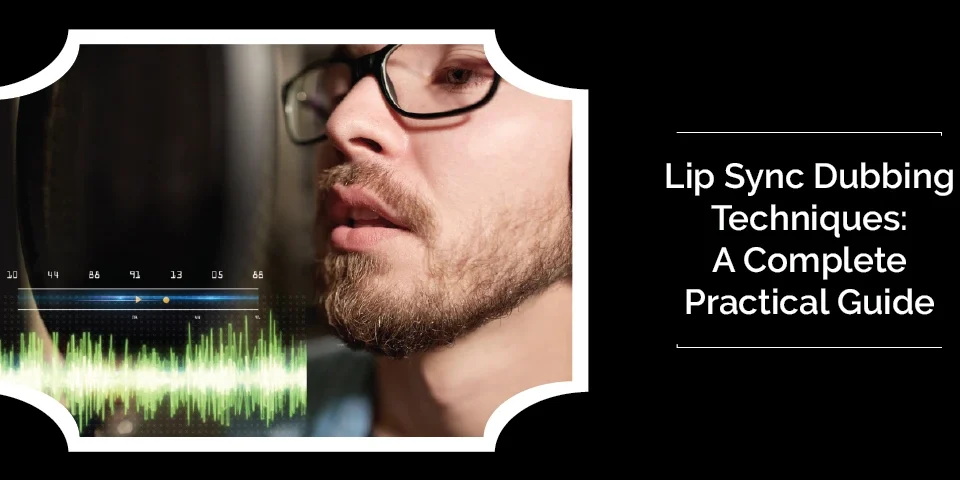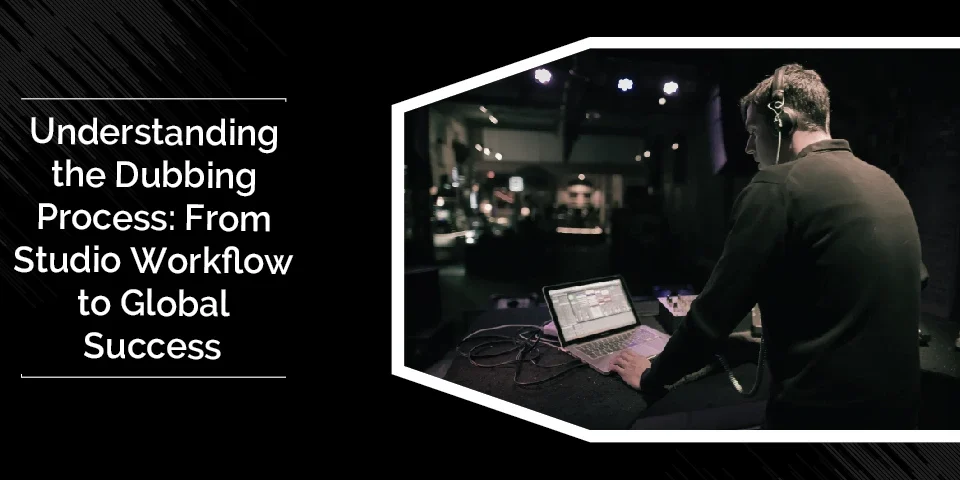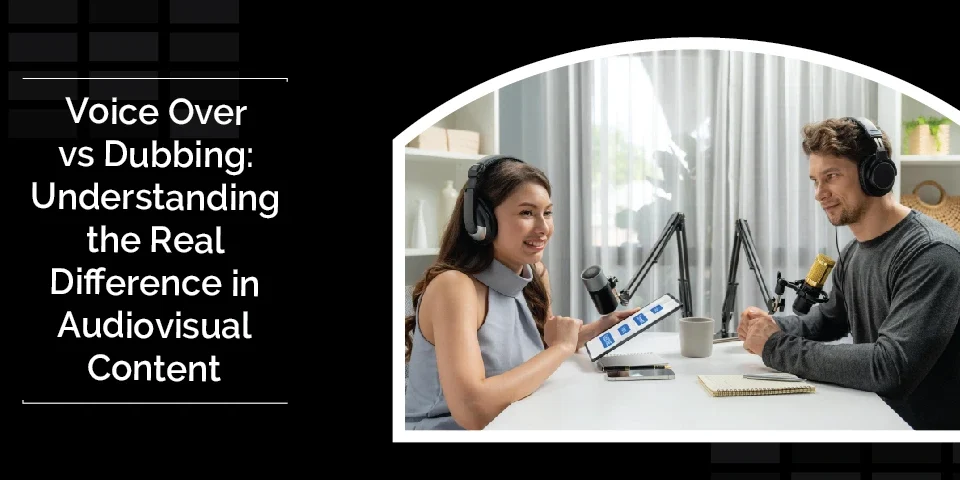
Voice-Over Industry: Why Human Voices Will Lead
May 9, 2025
10 Common Mistakes Beginner Voice-Over Artists Should Avoid
May 28, 2025Voice-overs are powerful tools in advertising. They help brands connect with audiences on a personal level, making the message more relatable and memorable. A thoughtfully chosen voice adds character and ultimately boosts recognition and trust. Whether the goal is to inform, inspire, or entertain, the right voice makes all the difference in shaping a brand’s identity and driving audience engagement.
In this comprehensive blog post, we will find the scope of AI and human voiceovers in commercial advertisements while carefully evaluating which is the best, AI or human voiceover, for commercial copies.
Contents
- 1. Lack of Emotional Depth and Authenticity
- 2. Limited Adaptability to Brand Identity
- 3. Struggles with Natural Speech Flow
- 4. Ethical and Legal Concerns
- 5. Consumer Perception and Trust Issues
- 6. Consumer Perception and Trust Issues
- 1. Emotional Connection and Persuasive Storytelling Through Human Voice
- 2. Flexibility and Adaptability in Human Voice-Over
- 3. Enhancing Brand Recall and Engagement with Human Voices
- Peter Abraham
A] The Importance of Voice in Advertising
Voice plays a crucial role in advertising by creating a bridge between the brand and its respective audience. A consistent voice allows brands to convey their message in a more familiar and personalised way to their audience. Besides, enhanced brand awareness, increased engagement, and improved brand recognition are some of the key benefits of using voice in commercials. In addition, a voice is the only medium that can adapt to the tone of the script, sprinkle emotions, and add authenticity to commercial advertisements, thereby boosting trust and sales.
For an in-depth analysis, read: Impact Of Voice Over Advertising In Online Video Adverts
B] Limitations of AI Voices in Advertising
1. Lack of Emotional Depth and Authenticity
AI algorithms recognise the voice pattern and deliver voices accordingly, which may lead to inadvertent alienation due to failed interpretation of subtle emotional cues. In addition, AI-generated voices often sound robotic, as they lack the emotional depth and authenticity due to the inability to convey nuanced emotions like warmth, urgency, or excitement.
2. Limited Adaptability to Brand Identity
Brand identity is built through voice consistency mixed with brand personality and value reflection through tailored commercial copy creation. A consistent voice can design the script and modify its tone based on the brand’s unique needs, allowing brands to progressively build their brand identity. Al-voices fails to adapt or modify the tone of the script based on the unique needs of the brand, posing limited adaptability to brand identity.
3. Struggles with Natural Speech Flow
AI voices often misplace emphasis or pause awkwardly, especially with long or complex sentences. They may struggle with humour, sarcasm, or subtle inflexions that come naturally to human speakers. The flow of the ad may feel disjointed or unnatural. This can distract listeners and take attention away from the brand message. This is why AI voices are not ideal for advertising.
4. Ethical and Legal Concerns
The rise of AI voices raises serious ethical issues, including potential misuse in deepfakes and synthetic identity fraud. This not only puts brand reputation at risk but also brings up licensing and copyright challenges. These issues highlight why AI voices are not ideal for advertising from both a moral and legal perspective. People may use them to mimic real voices without consent, leading to synthetic identity fraud. This can lead to costly legal disputes for brands using AI voiceovers.
5. Consumer Perception and Trust Issues
Audiences are becoming increasingly aware of synthetic voices, leading to a lack of authenticity and trust issues and reducing a commercial’s impact. Most people can tell when a voice is fake or generated by AI, eventually labelling them as untrustworthy. Surveys show that people prefer hearing real human voices in ads, making it important when brands want to connect and build trust with their audience.
6. Consumer Perception and Trust Issues
Consumers are becoming more aware of when they are listening to a computer-generated voice. AI voices can feel cold or artificial, which may negatively affect how people view the brand. This emotional disconnect can make audiences less likely to engage with the ad or trust the message.
C] How Human Voice-Over Can Improve Ad Performance and Brand Connection
1. Emotional Connection and Persuasive Storytelling Through Human Voice
Human voice-overs bring emotion and persuasion that AI simply can’t replicate. A professional voice actor can express empathy, humour, or excitement, helping to build trust and capture attention. When a voice sounds real, people are more likely to listen and act. Human voices turn ads into powerful stories, not just information.
2. Flexibility and Adaptability in Human Voice-Over
Human voices are also adaptable. Voice actors can change tone, style, and even accent depending on the message or audience. They can handle changes in script, brand mood, or campaign goals smoothly. This flexibility gives brands more creative control in their messaging.
3. Enhancing Brand Recall and Engagement with Human Voices
A human voice makes it easier for customers to remember and connect with a brand. A unique voice can become part of a brand’s identity, just like a logo or jingle. Familiar voices can trigger emotions and memories. Over time, this leads to stronger brand loyalty and customer engagement.
Conclusion
While AI technology is improving, it still falls short in delivering the emotion, trust, and brand alignment that human voiceovers offer. For brands looking to build trust, authenticity, and emotional resonance, human voiceovers remain irreplaceable. In short, AI voices are not suitable for commercials when a brand wants to stand out and build strong connections with its audience.
If you are ready to make an impact with a standout commercial campaign that resonates with your audience and brings leads and sales, hire a voice-over artist in India and make your brand stand out with a real human voice. Contact me now!

Peter Abraham
Peter Abraham is a versatile voice-over artist based in Mumbai working in the voiceover industry since 2009. With a passion for storytelling and meticulous attention to detail in every project, he brings scripts to life with his captivating voice and professional delivery, exceeding client expectations. Whether it's a commercial or an audiobook, Peter specializes in a wide range of voice-over work, ensuring the highest quality.




